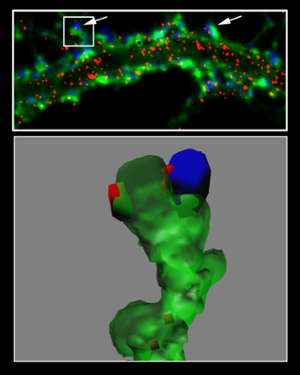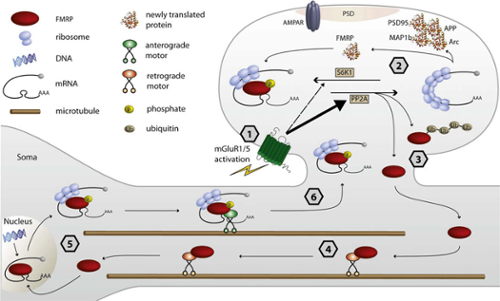Discovery of FMRP transport granules, their regulation by neuronal activity and function in mRNA transport and local translation

 Fragile x syndrome is the most common form of inherited intellectual disability that is caused by the loss of FMRP, an mRNA binding protein whose function in dendrites and at synapses had not been well understood.
Fragile x syndrome is the most common form of inherited intellectual disability that is caused by the loss of FMRP, an mRNA binding protein whose function in dendrites and at synapses had not been well understood.
We discovered FMRP transport granules and their regulated trafficking in dendrites and spines (Antar et al., Journal of Neuroscience 2004). We hypothesized that FMRP plays a role in mRNA localization in dendrites and that impairments in mRNA localization may contribute to synaptic defects in FXS. We discovered a novel role for FMRP as a kinesin adapter to facilitate activity regulated mRNA localization to dendrites, and discovered impairments in the regulated dynamics of mRNA transport granules in a mouse model of FXS (Dictenberg et al., Developmental Cell 2008).
 Top: FMRP granules within dendrites and spines of cultured hippocampal neurons. (Top) Triple label IF of FMRP (red), synapsin as a presynaptic marker (blue) and F-actin using phalloidin (green). Arrows denote FMRP granules that extend into F-actin rich spines near synapsin puncta. (Bottom) 3D reconstructed spine from boxed inset (from Antar et al., J. Neurosci 2004).
Top: FMRP granules within dendrites and spines of cultured hippocampal neurons. (Top) Triple label IF of FMRP (red), synapsin as a presynaptic marker (blue) and F-actin using phalloidin (green). Arrows denote FMRP granules that extend into F-actin rich spines near synapsin puncta. (Bottom) 3D reconstructed spine from boxed inset (from Antar et al., J. Neurosci 2004).
Role of the Fragile X Mental Retardation protein in regulation of mRNA transport and localization translation (Bassell and Warren, Neuron 2008, 60(2):201-214)
FMRP is in a complex with several translationally arrested mRNAs at the synapse. Following mGluR stimulation, FMRP-target mRNAs are rapidly derepressed, allowing for local translation. A second phase of FMRP-dependent plasticity is shown that involves the subsequent transport of new mRNAs from the cell body into dendrites. (schematic by Sharon Swanger)
